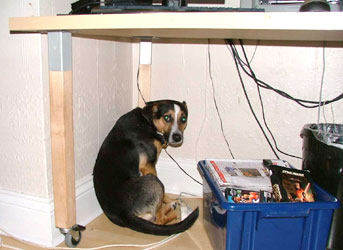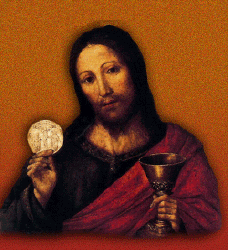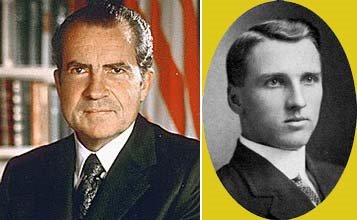Faith Overcomes Fear

12th Sunday in Ordinary Time
Today's Readings: Job 38:1, 8-11; Ps 107; 2 Cor 5:14-17; Mk 4:35-41 [Link to Readings]
For months now, my sister has been after me to watch a TV show that I finally got to see for the first time this past week. It’s called The Dog Whisperer. In case you haven’t heard of it, it’s kind of a reality show where an animal psychologist and expert trainer travels around the country to teach people how to deal with their problem dogs.
In the show that I saw, there was a young dog who was very scared of people, including his owner. He would shy away if you tried to touch him, and he’d cower behind the furniture unless you physically dragged him out. In short order, Cesar Millan, the star of the show, figured out what the dog’s problem was and fixed him up. It was incredible to see the transformation this dog went through—from being constantly scared to death to being upfront, confident, relaxed… and trusting his human master.
In many ways, that’s a canine version of the gospel story we heard today. Jesus and his disciples got into a boat to cross the Lake of Gennesaret. It wasn’t a big lake—maybe 14 miles long and just 3 to 7 miles wide, depending on where you were. But storms could come up quite suddenly as the winds swept down from the mountains of Lebanon. That seems to be what happened today. The disciples absolutely panicked. They were certain that the boat was going to be swamped any minute, and suddenly they realized that there was Jesus in the back of the boat, sprawled out and fast asleep on a cushion, apparently unconcerned that they were all about to die. And even though the storm didn’t wake him, the disciples did. In their hysteria, they shouted at him, “Teacher, don’t you care that we’re dying?” They wanted Jesus to get off that cushion and lend a hand with a bailing bucket.
But bailing out the boat wasn’t part of Jesus’ agenda. Even though the disciples expected him to jump to his feet and join the team by bailing or grabbing the oars, Jesus ignored the boat completely. Instead, he went straight to the source of the problem. He commanded the storm to subside. And the disciples couldn’t believe it!
I know that we’ve all been in stormy situations in our life when we’ve probably been tempted to yell at God, “Don’t you care that I’m dying here?” Maybe we’ve thought to ourselves: if God really exists and loves us and can calm storms and actually do anything he wants, then why is he letting this go on? Why doesn’t he care?
Well, the truth be told, it’s not that God doesn’t care. It’s just that he’s not worried about the storm. Look at Jesus in that boat. He trusted God, so he could sleep like a baby even with the storm raging and his friends panicking all around him.
So: after the disciples survived their near-death experience, and after they witnessed the miracle of the sea and sky obeying Jesus, Mark tells us that “they were filled with great awe and said to one another, ‘Who then is this whom even wind and sea obey?’” The literal translation of the phrase, “filled with great awe” is that they “feared a great fear.” They were overwhelmed by the sheer magnitude of what had just happened. I have the feeling that even after seeing what Jesus was capable of, the disciples still feared what this meant. Their big question wasn’t “How did he do that?” It was “Who is this person?” And that made them really afraid.
Jesus acknowledged their fear, but he suggests to them that the opposite of fear is faith. In his deep love for his flock, Jesus desperately wants his people to have the kind of faith in God that would let them sleep through a storm at sea, too. Jesus knows we all have fears, but he wants us to release those fears so we can find faith, hope and love in God. Just like the Dog Whisperer takes the fear out of his dogs, Jesus wants to take the fear out of us… and replace it with faith.
I read a wonderful acronym for the word fear: F-E-A-R: False Evidence Appearing Real. Sometimes we get so caught up in what we fear—which may or may not ever come to pass—that we can’t do anything. We become paralyzed.
The disciples thought only about dying in that boat… but it never happened!
Lots of us suffer through terrible relationships or addictions or personal problems or secrets because we’re scared that people will reject us or abandon us if they knew the real truth. Isn’t that funny? We’re afraid that the people we love and trust are going to turn on us because we have a problem. Many times—if not most times—those fears are really based on false evidence.
What’s ironic is that we think that if we give in to the fear, it’s because we’re trying to keep ourselves safe… but our fear and our desire to be safe aren’t going to protect us one whit from whatever is heading our way! Just think: all that energy spent on fear could be redirected into an empowerment to face, and maybe even enjoy, the present. That’s faith.
Faith can overcome fear. Faith overcoming fear means trusting that God loves us, has redeemed us and calls us children of God. Faith overcoming fear means depending on all the graces and blessings and resources that God makes available to us as his children. Faith overcoming fear means that even though we may not know the details of the future, we are sure of the outcome. I have another great acronym for you—for the word faith: F-A-I-T-H: Forget About Impossibilities—There’s Hope! We have hope, even in the impossible storms of life.
In time, the disciples learned to turn their fear into faith. The church is our inheritance of that faith. I saw on TV that even a scared dog can overcome his fear. So the really good news is, so can we.
When the storms of life threaten to overcome us… when the power of fear starts to overtake the power of faith… keep in mind the power of God. Amen.



